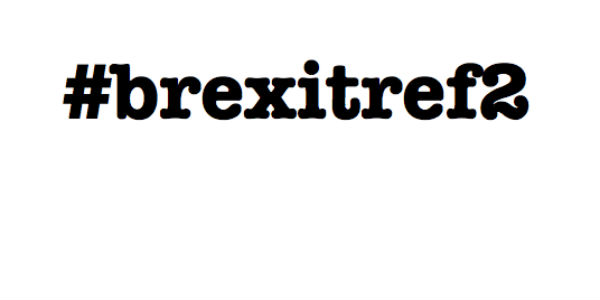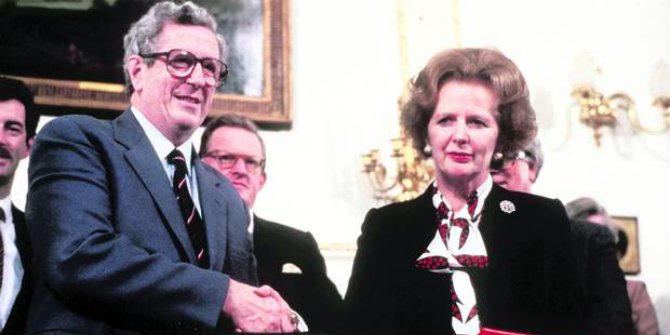 If – and it’s a big if – the government were to call a second EU referendum, what question would it ask? And would it be able to deliver the answer? In this extract from a new UCL European Institute working paper, Alan Renwick examines the likelihood, terms and outcome of any ‘second round’ vote.
If – and it’s a big if – the government were to call a second EU referendum, what question would it ask? And would it be able to deliver the answer? In this extract from a new UCL European Institute working paper, Alan Renwick examines the likelihood, terms and outcome of any ‘second round’ vote.
There was talk of a second referendum even before the result of the June referendum was known. In the days immediately following that vote, more than four million people signed a petition favouring a repeat poll. Many signatories cited the close result and the widespread misinformation during the campaign as justifications for their view.
The idea of a straightforward rerun was neither sensible nor feasible. The vote was fought according to the rules set in advance, which included no special threshold requirements and which contained safeguards on the balance of campaigning, but not on its quality. Some of these arrangements were certainly ill-advised, but they cannot be changed after the fact. Most voters consider that the vote has given the government a mandate to initiate Brexit negotiations, and that should be respected.
Much more interesting is the idea that there should be a second referendum that would ask a different question from the first: whether voters accept the Brexit deal once it has been negotiated between the government and other EU member states. This is the official position of the Liberal Democrats and was advocated by Owen Smith during his campaign for the leadership of the Labour Party. Others who say at least that it is an option that should be kept open include former prime ministers John Major and Tony Blair. This is a serious idea: given the considerations noted previously, the democratic case for it is strong.
There are no restrictions in the UK on when parliament can call a referendum or what the subject matter can be. But a referendum can be held only with the approval of parliament: the government cannot initiate such a vote on its own. Any referendum must be authorised in parliament through specific primary legislation.
Four principal questions about a second EU referendum need to be asked. First is the key question of what it would actually be about – we need to know more than that it would be on the terms of the Brexit deal. Second is the equally important question of what the effect of any given outcome in the referendum would be: there is no guarantee that the outcome would always straightforwardly be what is on the ballot paper. Third, we can ask what the likelihood is that a referendum of any given form will actually take place.Finally, we can consider what can be said at present about the likely referendum result.
The subject matter of a second referendum
As just indicated, any second referendum is likely to be on the terms of the Brexit deal that are negotiated over the next few years (though it is not impossible that developments over the coming years might generate conditions favouring another sort of referendum). One option in any such referendum would therefore be to accept the terms of that deal and proceed towards Brexit on that basis.
But what would be the alternative on the ballot paper for voters who dislike the deal? There are three basic options:
- First, voters might be asked whether they want to accept the deal or to remain in the EU after all. In essence, voters would be asked to consider whether, now that the nature of Brexit is clear, they still want it or not.
- Second, voters might be asked whether to accept the deal or to leave the EU without a deal. Article 50, as explained in section 2.1, offers two routes to withdrawal from the EU: either withdrawal terms can be negotiated; or, if no deal is done and the negotiating deadline is not extended, the withdrawing country automatically leaves after two years. The referendum would essentially allow voters to choose which of these routes the UK will take.
- Third, voters might be asked whether to accept the deal on offer or mandate the government to go back to the EU in search of a better deal. The government might be interested in seeking such a referendum if it finds that other EU countries are refusing to concede negotiating terms that the government finds satisfactory.
One possibility is that parliament would set a question that does not make the alternative explicit: it would set a yes/no question where voters are asked to accept the terms of the deal or not accept them. Parliament might take this course in order genuinely to keep its options open in the event that the deal was rejected, or in order to use the uncertainty such a question would generate to drive voters towards accepting the deal on offer. But such a question would rightly be criticised for failing to give voters a clear choice. Referendum questions are assessed by the Electoral Commission, which might well express grave concerns about such vagueness. It is ultimately for parliament to decide whether to accept the Electoral Commission’s advice or not, but it has done so every time the Commission has proposed changes to question wording to date. A government or parliament that went against that advice would not be acting in the interests of effective democracy.
That being the case, it would be necessary to specify one of the alternatives above. But which would it be? It would be almost without precedent for a referendum to be held in which the status quo was not available as an option. (The only referendum I am aware of that broke that rule was a referendum on the electoral system in the Australian Capital Territory in 1992. A new electoral system was adopted in 1989, but there was universal agreement that it was deeply flawed. The referendum therefore gave voters a choice between two possible replacements.) Given that the UK is currently in the EU, that would seem strongly to favour the first option. On the other hand, once Article 50 has been triggered, there is a good case for saying that the course that the country is on is towards Brexit, and that the default – what automatically happens if nothing else is done – is Brexit without a deal. Or it could be said that triggering Article 50 puts the UK in the EU’s departure lounge and that the options should be to stay in that departure lounge, seeking to negotiate a better deal, or to leave the departure lounge (and the EU) with the terms that are on offer. Thus, while a referendum that did not offer the status quo of EU membership as an option would be highly unusual, it could be said to be justified by the equally unusual circumstances created by the Article 50 trigger.
Whatever options might be put on the ballot paper, the next question concerns what would actually happen once any of these options had been voted for: putting an option on the ballot paper does not necessarily mean that it will actually happen in the form suggested by the ballot paper.
The effects of each possible referendum outcome
It appears very likely that a vote for the Brexit deal that has been negotiated would mean that the UK would indeed leave the EU according to the terms of that deal. But questions can be asked about the realisability of any of the alternatives to that option:
- A vote to stay in the EU after all might lead straightforwardly to that outcome if the ECJ has by then ruled that a country can unilaterally revoke its triggering of Article 50. If the ECJ has by then ruled the opposite, staying in the EU would require the unanimous consent of all the member states (which they might be willing to grant only in return for certain concessions). If the ECJ has not yet ruled, then the UK might seek unanimous agreement for its continued EU membership or it might declare its unilateral revocation of the Article 50 trigger and wait to see whether anyone challenged that.
- A vote to reject the deal and withdraw with no deal would certainly be deliverable. The question is whether it would actually be delivered. If ministers had recommended acceptance of the deal, they would presumably resign having lost the vote. It would not be surprising if this forced an early election. Both the Conservative and Labour parties would likely be in turmoil, and it is impossible to predict the public mood. Much would depend on what the deal’s opponents had argued during the referendum campaign: if they had argued for Brexit without a deal, that might well happen; if they had argued, notwithstanding the words on the ballot paper, that rejection of the terms on offer could lead to a better deal (or possibly even continued EU membership), such a revised deal might be pursued – though whether other European governments would play along with this might not be clear. In all likelihood, different campaigners would have argued many different things, so subsequent developments would depend heavily on who managed to win the post-referendum scramble for power.
- If the government has called the referendum in order to seek public rejection of the deal on the table and a mandate for pursuing better terms, it would presumably, if it won that vote, then seek such terms. What would happen then would lie in the hands of other EU governments: they might offer very little else; they might refuse to extend the negotiating time, thereby pushing the UK either into disorderly Brexit without a deal, or into an ignominious climb down and acceptance of the withdrawal terms it has just rejected. This could be avoided, at least for a time, if it has been determined that the UK can unilaterally revoke and then re-invoke the Article 50 trigger. Even this manoeuvre, however, might not yield substantially better terms – and might, indeed, only antagonise the UK’s European neighbours.
Thus, there is much uncertainty as to what would happen in a second referendum if the deal on the table were rejected by voters. Some of that uncertainty might have been cleared up before any such vote could happen: specifically, an ECJ ruling might by then have made it clear that a vote to stay in the EU after all is entirely deliverable. Other sources of uncertainty are likely to remain until after the vote has taken place.
This post represents the views of the author and not the Brexit blog, nor the LSE. It is an extract from the UCL European Institute’s working paper The Process of Brexit: What Comes Next? and first appeared at Democratic Audit.
Alan Renwick is Deputy Director of the UCL Constitution Unit.








Oh dear, have you got nothing else to do with your time? Get over it man, don’t be a sad remoaner for the rest of your life. There isn’t going to be a second referendum.
There’s no likelihood for a ‘second round’ vote.
I was not allowed to vote in the referendum because I have lived abroad in an EU country for more than 15 years.
If I am allowed to vote in a second referendum, I plan to vote for Britain to remain in the European Union.
If the possibility of remaining in the EU is not on the ballot paper, I intend to write it on by hand.
A second referendum (especially one with an option to stay in the EU), is a complete non starter. It would ensure that the EU give the worst possible deal in the hope that we stay in the EU. It would spike our guns.
Clearly, announcing a second referendum which offers the option of staying in the EU before the negotiations have been held would not be a sensible thing to do. As you say, it would virtually guarantee a very poor deal being offered by the EU. That is not what is being suggested as a possible outcome. Any second referendum would be offered near to the end of the process, not as it starts.
I believe a second referendum is very unlikely to be offered, unless it is forced on the Government by a change in public opinion. Two years is a long time: easily long enough for the majority to change its mind if the deal negotiated does not match Leaver’s expectations and the majority of the electorate no longer believes that leaving the EU is in their interests. This could be especially acute if a weaker economy and inflation has eroded living standards over the next two years.
The referendum result could not have been much closer and leaves little margin of safety. It would be a brave government which took the country out of the EU against the will of the people if opinion shifts against Brexit. A second referendum would be a way out for them, under these circumstances.
I believe a second referendum would only be offered (in reality forced) as a response to public pressure for one. I don’t believe second referendum would be offered as a result of a poor deal being struck, even if it was known the deal would damage the UK. Leaving the EU is ideologically driven and the hard line Eurosceptics driving the process are likely to be willing to sacrifice much to achieve it. But if there are sacrifices to be made (even this is uncertain) – will the public be willing to join them? We shall know in two years time.
Brexiters are the public, and according to yougov polls last week only 22% want another referendum.